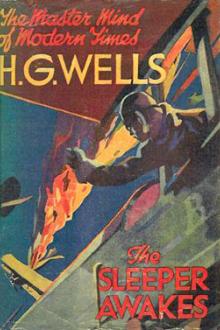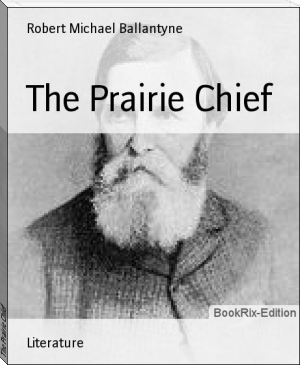Charlie to the Rescue, Robert Michael Ballantyne [pocket ebook reader txt] 📗

- Author: Robert Michael Ballantyne
Book online «Charlie to the Rescue, Robert Michael Ballantyne [pocket ebook reader txt] 📗». Author Robert Michael Ballantyne
"Here, where are you? Oh! All right. Haven't you got a match?" asked the captain.
"Nothin' that would burn more'n a few seconds. We're better without a light, for a gust o' wind might blow it out an' leave us worse than we was. Mind this step. There."
"Well, I'm glad I didn't bring any of my men in here," said the Captain, as he kicked one of his heavy boots violently against a projection of rock.
"Ay--'tis as well you didn't," returned the scout, in a tone suggestive of the idea that he was smiling. "For there's holes on both sides, an' if one o' your men went down, ye might read the funeral sarvice over him at once, an' be done with it. There's a glimmer o' daylight at last. We'll soon be at the other end now."
"A horrible place, truly," said the Captain, "and one that it would be hard to find a fellow in even if we knew he was here."
"Didn't I say so, Captain? but ye wouldn't be convinced," said Hunky Ben, leading his companion into the full light of the opening and coming to a halt close to the ledge above which the fugitive lay. "Besides, Leather could never have found his way here alone."
"You forget," returned Wilmot, with a peculiar smile, "the monster might have shown him the way or even have carried him hither."
"Ah, true," answered the scout, with solemn gravity. "There's somethin' in that."
Wilmot laughed.
"What a splendid view," he said, going forward to the opening--"and see, here is a bed of pine brush. No doubt the cave must have been used as a place of refuge by the Redskins in days gone by."
"Ay, an' by the pale-faces too," said the scout. "Why, I've had occasion to use it myself more than once. And, as you truly obsarve, sir, there's small chance of findin' a man once he's in here. As well run after a rabbit in his hole."
"Or search for a needle in a haystack," observed the Captain, as he gazed with curious interest around and above him. "Well, Ben, I give in. You were right when you said there was no probability of my finding any of the outlaws here."
"I'm ginerally right when I speak about what I understand," returned the scout calmly. "So now, Captain, if you're satisfied, we may as well go an' have a look at the other places I spoke of."
Assenting to this the two men left the place, but Leather continued to lie perfectly still for a considerable time after their footsteps had died away. Then, gliding from his perch, he dropped on the floor and ran to the opening where he saw the troopers still riding about, but gradually going farther and farther away from him. The scene was not perhaps, as the scout had prophesied, quite "as good as a play," but it certainly did become more and more entertaining as the searchers receded and distance lent enchantment to the view.
When at last the troops had disappeared, Shank bethought him of the food which Hunky Ben had so thoughtfully provided, and, sitting down on the brush couch, devoted himself to breakfast with a hearty appetite and a thankful spirit.
Meanwhile Captain Wilmot, having satisfied himself that the outlaws had fairly escaped him, and that Buck Tom was too ill to be moved, retired to a cool glade in the forest and held a council of war with the scout and Charlie Brooke.
"Now, Ben," he said, dismounting and seating himself on a mossy bank, while a trooper took charge of the horses and retired with them to a neighbouring knoll, "it is quite certain that in the present unsettled state of the district I must not remain here idle. It is equally certain that it would be sudden death to Buck Tom to move him in his present condition, therefore some men must be left behind to take care of him. Now, though I can ill afford to spare any of mine, I feel that out of mere humanity some sacrifice must be made, for we cannot leave the poor fellow to starve."
"I can relieve you on that point," said the scout, "for if you choose I am quite ready to remain."
"And of course," interposed Charlie, "I feel it my duty to remain with my old friend to the end."
"Well, I expected you to say something of this sort. Now," said the captain, "how many men will you require?"
"None at all, Captain," answered Ben decisively.
"But what if these scoundrels should return to their old haunt?" said Wilmot.
"Let them come," returned the scout. "Wi' Mr Brooke, an' Dick Darvall, an' three Winchesters, an' half-a-dozen six-shooters, I'd engage to hold the cave against a score o' such varmin. If Mr Brooke an' Dick are willin' to--"
"I am quite willing, Ben, and I can answer for my friend Dick, so don't let that trouble you."
"Well, then, that is settled. I'll go off at once," said the captain, rising and signing to the trooper to bring up the horses. "But bear in remembrance, Hunky Ben, that I hold you responsible for Buck Tom. If he recovers you must produce him."
The scout accepted the responsibility; the arrangements were soon made; "boots and saddles" was sounded, and the troopers rode away, leaving Charlie Brooke, Dick Darvall, Buck Tom, and the scout in possession of the outlaws' cave.
CHAPTER TWENTY FOUR.
THE MEETING OF OLD FRIENDS IN CURIOUS CIRCUMSTANCES.
When the soldiers were safely away Hunky Ben returned to the cave and brought Leather down.
Charlie Brooke's love for his old school-fellow and playmate seemed to become a new passion, now that the wreck of life and limb presented by Shank had awakened within him the sensation of profound pity. And Shank's admiration for and devotion to Charlie increased tenfold now that the terrible barrier of self had been so greatly eliminated from his own nature, and a new spirit put within him.
By slow degrees, and bit by bit, each came to know and understand the other under the influence of new lights and feelings. But their thoughts about themselves, and their joy at meeting in such peculiar circumstances, had to be repressed to some extent in the presence of their common friend Ralph Ritson--_alias_ Buck Tom--for Charlie knew him only as an old school-fellow, though to Leather he had been a friend and chum ever since they had landed in the New World.
The scout, during the first interval of leisure on the previous day, had extracted the ball without much difficulty from Buck's chest, through which it had passed, and was found lying close under the skin at his back. The relief thus afforded, and rest obtained under the influence of some medicine administered by Captain Wilmot, had brightened the poor fellow up to some extent; and Leather, seeing him look so much better on his return, began to entertain some hopes of his recovery.
Buck himself had no such hope; but, being a man of strong will, he refused to let it be seen in his demeanour that he thought his case to be hopeless. Yet he did not act from bravado, or the slightest tincture of that spirit which resolves to "die game." The approach of death had indeed torn away the veil and permitted him to see himself in his true colours, but he did not at that time see Jesus to be the Saviour of even "the chief of sinners." Therefore his hopelessness took the form of silent submission to the inevitable.
Of course Charlie Brooke spoke to him more than once of the love of God in Christ, and of the dying thief who had looked to Jesus on the cross and was saved, but Buck only shook his head. One afternoon in particular Charlie tried hard to remove the poor man's perplexities.
"It's all very well, Brooke," said Buck Tom, "and very kind of you to interest yourself in me, but the love of God and the salvation of Christ are not for me. You don't know what a sinner I have been, a rebel all my life--all my life, mark you. I would count it mean to come whining for pardon now that the game is up. I _deserve_ hell--or whatever sort o' punishment is due--an' I'm willing to take it."
"Ralph Ritson," said Brooke impressively, "you are a far greater sinner than you think or admit."
"Perhaps I am," returned the outlaw sadly, and with a slight expression of surprise. "Perhaps I am," he repeated. "Indeed I admit that you are right, but--but your saying so is a somewhat strange way to comfort a dying man. Is it not?"
"I am _not_ trying to comfort you. I am trying, by God's grace, to convince you. You tell me that you have been a rebel all your days?"
"Yes; I admit it."
"There are still, it may be, a few days yet to run, and you are determined, it seems, to spend these in rebellion too--up to the very end!"
"Nay, I do not say that. Have I not said that I _submit_ to whatever punishment is due? Surely that is not rebellion. I can do nothing _now_ to make up for a mis-spent life, so I am willing to accept the consequences. Is not that submission to God--at least as far as lies in my power?"
"No; it is _not_ submission. Bear with me when I say it is rebellion, still deeper rebellion than ever. God says to you, `You have destroyed yourself but in _me_ is your help.' He says, `Though your sins be as scarlet they shall be white as snow.' He says, `Believe on the Lord Jesus Christ and you shall be saved,' and assures you that `whoever will' may come to Him, and that no one who comes shall be cast out--yet in the face of all that you tell me that the love of God and the salvation of Christ are not for you! Ralph, my friend, you think that if you had a chance of living your life over again you would do better and so deserve salvation. That is exactly what God tells us we cannot do, and then He tells us that He Himself, in Jesus Christ, has provided salvation from sin _for_ us, offers it as a free unmerited gift; and immediately we dive to the deepest depth of sin by deliberately refusing this deliverance from sin unless we can somehow manage to deserve it."
"I cannot see it," said the wounded man thoughtfully.
"Only God Himself, by His Holy Spirit, can enable you to see it," said his companion; and then, in a low earnest voice, with eyes closed and his hand on his friend's arm, he prayed that the outlaw might be "born again."
Charlie Brooke was not one of those who make long prayers, either "for a pretence" or otherwise. Buck Tom smiled slightly when his friend stopped at the end of this one sentence.
"Your prayer is not long-winded, anyhow!" he said.
"True, Ralph, but it is comprehensive. It requires a good deal of expounding and explaining to





Comments (0)